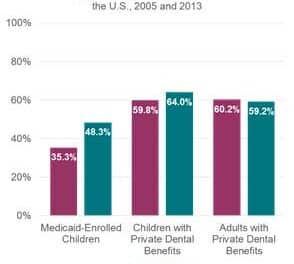The ADA and a coalition of industry stakeholders urged Congress to support the Medicaid Dental Benefit Act which expands dental benefits to all states.
The American Dental Association and a group of likeminded stakeholders are supporting the Medicaid Dental Benefit Act of 2021, which would make comprehensive dental care a required component of Medicaid coverage for adults in every state.
In a July 7 letter to leaders of the House and Senate, the coalition urged lawmakers to support the bill and said, the pandemic has “shone a spotlight on the inadequacies within our social safety net programs, most starkly in oral health care.”
The groups noted that during COVID-19, almost half of U.S. adults reported delaying dental care, according to the Journal of Dental Research and said, “unfortunately, this problem has only grown due to the large increases in Medicaid enrollment since the start of the pandemic.”
“Many adults who rely on Medicaid benefits find that there is little, if any, coverage for dental care,” the group stated in its letter. “A long-standing lack of focus on adult oral health care from federal and state governments has created a patchwork of dental coverage by state Medicaid programs.”
The letter also said that American adults who rely on Medicaid find dental care options vary based on the state, noting that less than half provide extensive dental coverage for adults in their Medicaid programs. Other states only offer limited benefits, emergency-only coverage, or no dental coverage at all for adults.
“This lack of state coverage is particularly problematic because the millions of adults who rely on Medicaid are the least likely to access dental care (including basic preventive services), face the biggest cost barriers to dental care, and are more likely than their higher income counterparts to experience dental pain, report poor mouth health, and find their lives to be less satisfying due to their poor oral health,” the coalition wrote.
“Ensuring that states provide comprehensive dental services to adult Medicaid beneficiaries is a sound economic and equitable investment,” they added.
The coalition shared research from the ADA’s Health Policy Institute that showed how providing comprehensive dental services to adult Medicaid beneficiaries is a sound economic investment.
The study revealed that across the 28 states that do not provide comprehensive dental coverage, the net cost of providing extensive adult dental benefits is $836 million per year. This includes an estimated $1.1 billion per year in dental care costs and $273 million per year in medical care savings.
“As Medicaid oral health coverage opens the door to regular care in more appropriate and cost-effective settings, fewer people would turn to emergency departments to relieve dental pain,” the letter stated. “This change could save our health system $2.7 billion annually. Also, poor oral health creates social and economic barriers that prevent many low-income adults from economic advancement. Eliminating these barriers would generate additional savings and empower people to pursue better jobs and careers.”
Photo 52637211 © Alexandre Fagundes De Fagundes | Dreamstime.com









